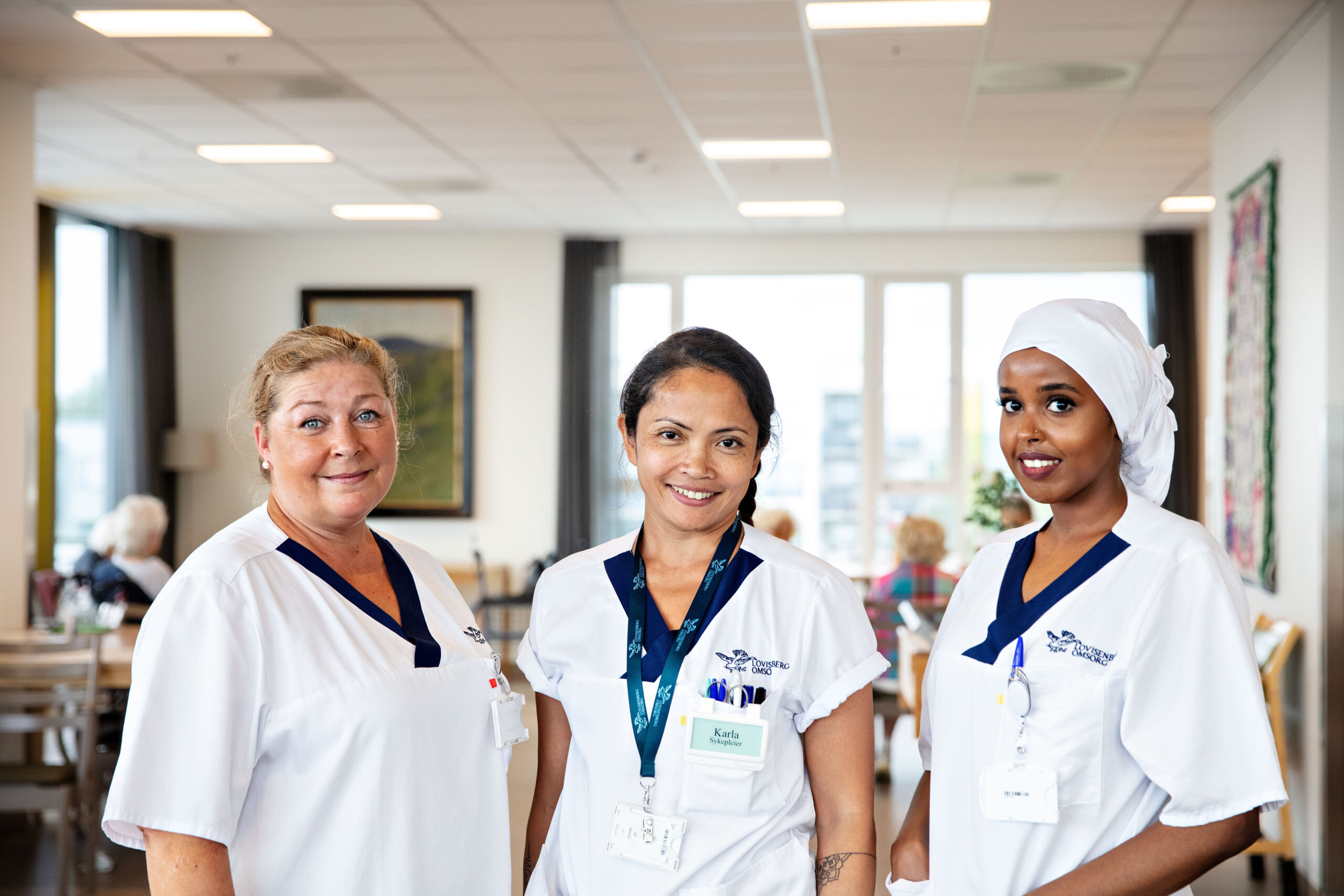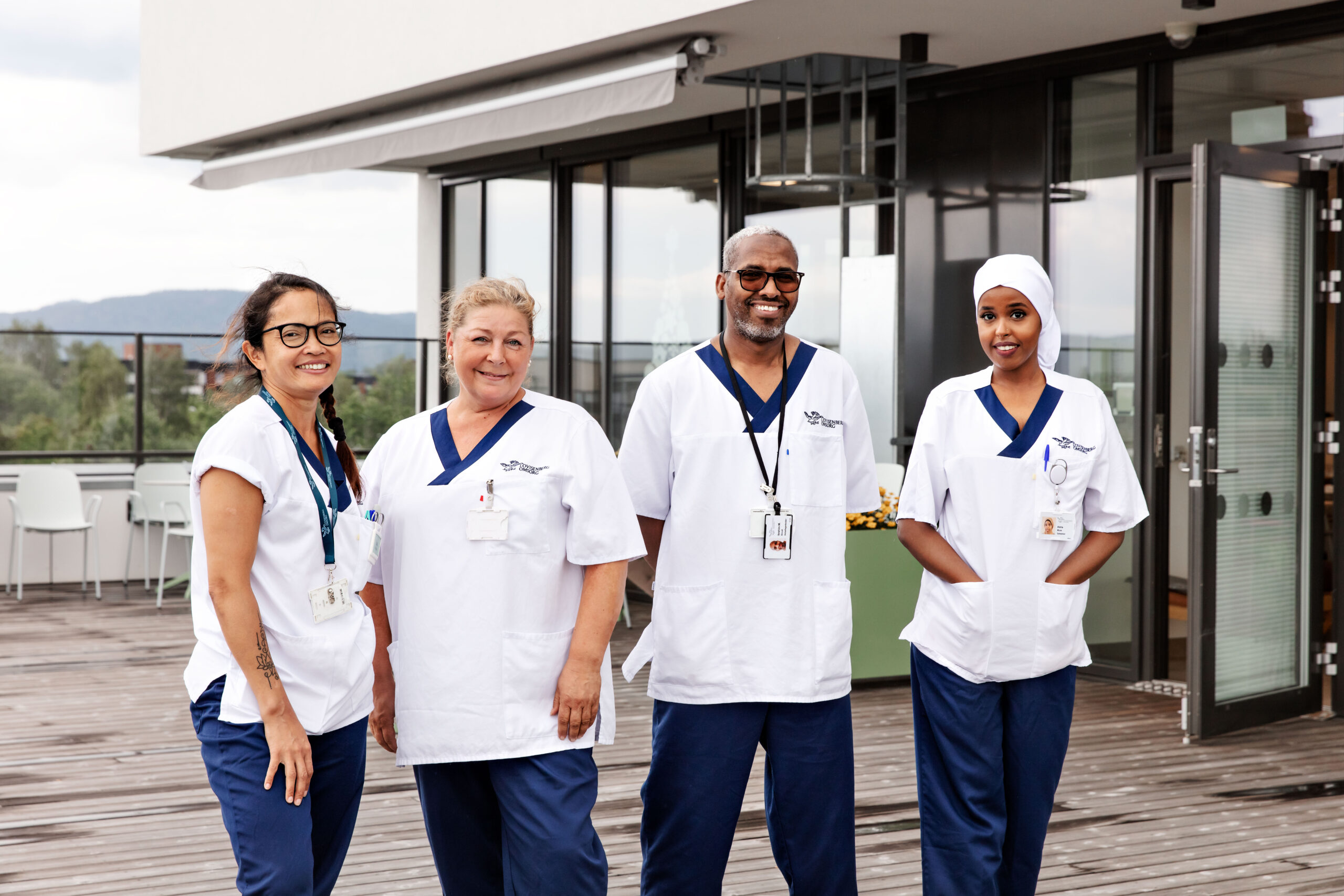
A Department Manager's story
Siri H. Christiansen walks so fast along the corridors that other people have to jog just to keep up. The name tag stating “Department Manager at Hovseterhjemmet [Care Home]” has graced her uniform for 21 years. She is in charge of around 70 full- and part-time employees, as well as 24 residents, and interacts with everyone from relatives to student nurses with a level of calm and warmth that only years of experience can provide.
«I started here as a care assistant back in 1993 and completed my training as a nurse in 1999; and I have always been passionate about geriatric nursing», says Siri. «During my years in the profession, I have been able to trace a clear trend: the people who come here are older, they have many more diagnoses and more specific dementia diagnoses. What is more, almost all our residents unfortunately need to use some kind of incontinenceincontinence Involuntary loss of control of the bladder and / or intestines. product.»
«I am passionate about preserving dignity by providing our residents with individualised care.»
Siri H. Christensen, Department Manager Hovseterhjemmet
When Siri was offered the opportunity to attach an alerting device to incontinence products, the first thing she did was put together a project team. Asked to choose whether they wanted to be involved, the team members quickly formed a committed group. «I’m proud to say that my project team contributed to developing the DignaCare solution. We’ve been involved from an early phase as a pilot partner, and we provided valuable input to help develop the solution as it appears today. Before the project itself started, the team devoted a good deal of time to ethical consideration – and to conducting a thorough risk analysis.»

«The incontinence sensor is a natural part of everyday operations in our department at Hovseterhjemmet [Care Home] today. Whenever a new resident joins us, we consider whether he or she would benefit from using this solution. There are 24 residents here, of whom 19–20 suffer from some level of incontinence. Our approach is to ask for written consent from the relatives before a resident starts to use the DignaCare sensor. On the back of two years of experience, it is clear to see how a little sensor can enhance the health of the residents, as well as improving our own procedures and working environment», affirms Siri.
As department manager, it is common for Siri to interact with relatives, who are often surprised to witness what happens to their parents when the effects of old age start to appear.
«Firstly, the vast majority of people find the whole topic of incontinence taboo and intensely personal. Secondly, a lot of relatives have no experience whatsoever with what happens when the human body reaches an advanced age. Some relatives have had problems at home with parents who have been unable to sleep and begun to wander around the house at night. They have also experienced issues with leakage, resulting in wet bed linen and furniture covers. Care home residents who can still think clearly naturally find it embarrassing to have lost control of their urine and faeces, and many of them refer to it as being like a baby again.»
«In standard care for the elderly, this has previously been dealt with by implementing routines whereby the night staff check all residents three times every night to see whether they need changing or care. This has, of course, meant that the residents are woken unnecessarily often. We have noticed that interrupted sleep has a negative effect on our residents. Waking them at night caused unnecessary sleep disturbance, leading to both verbal and motor unease – which, in turn, often resulted in them waking the other residents. The new system makes a world of difference. The night shift staff receive a discreet alert via an app and change residents as the need arises. This means that the changes have become adapted to the individual needs of each resident. The alerts sent to my staff are adapted to match the situation of the individual resident. As we have to change bed linen completely less often, we can take care of things with a single employee rather than two in many cases. And the fact that we change diapers based on the needs of the residents themselves means that we can show more consideration to the individual. It also enables us to prevent sores and skin problems and helps to reduce the incidence of urinary tract infections. Perhaps the most important factor for me is that residents enjoy a better night’s sleep. It’s all a question of dignity. We can now work with incontinence products more easily, which naturally has a beneficial effect on the everyday lives of our residents.»
«The new procedures mean improved care quality in that all residents are changed as soon as they need it, we have to do fewer full changes of bed linen, and there are fewer leaks into clothes and onto chairs and sofas. Better sleep at night means that residents show improved cognitive ability during the day. All in all, it frees up a lot of time for my team to concentrate on other care tasks.»
Siri highlights two stories about residents that made an impression on her: «One of our residents was extremely uncomfortable and anxious when it came to care procedures and changes, and she also had to have her bed linen changed completely several times a night. She naturally found this extremely upsetting and as a result she often made a lot of fuss and noise that woke some of the other residents. Introducing the sensor reduced the nightly changes to one per night. This allowed her to sleep better and undisturbed for longer at night, so she started enjoying her waking hours more.»
«Another of our clear-minded residents was fully aware that she was incontinent. She had also sometimes heard other residents saying that she smelled bad. Unfortunately, like many others, she didn’t notice when she was wet. She was really ashamed and embarrassed about the whole situation. She didn’t want to participate in social activities anymore, and started to withdraw into herself. Using the sensor gave her confidence that her ‘little accidents’ would be dealt with straight away and she was no longer worried about the smell. She has since become one of our most social residents. In addition, we succeeded in treating her sores, which disappeared completely.»
«Incontinence is a common challenge among elderly people, leading to a good deal of frustration and shame at not being able to handle toilet visits by themselves.»
«I’m passionate about making everyday life easier for my colleagues and about helping our residents live with more dignity through individualized care. When other people ask me if I would have used this solution for my own parents, I reply ‘yes’ without the slightest hesitation», concludes Siri H. Christiansen.